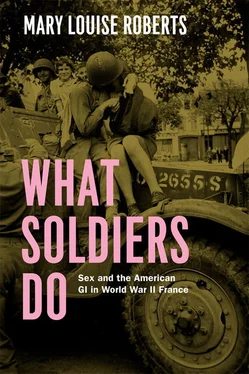The destruction was all the more painful because the GIs had fallen in love with the French countryside. Although they complained about “those bastard hedgerows”—thick bushes that presented obstacles in the breakout from the beachheads—the Americans also expressed rapture for Normandy. Even the war could not erase its splendor. “Sunrise and sunset are both awe-inspiring on favorable weather days,” wrote Sidney Bowen to his wife. 82Orval Faubus noticed “the change from one day to the next, from the grim and terrible scenes of Mortain Hill to the pretty villages and towns and beautiful countryside… from the stench of the battlefield to the fragrance of flower gardens along the roads.” 83“It is very beautiful country,” wrote Corporal Crayton to his parents, “the birds have begun their daily practice, all the flowers and trees are in bloom, especially the poppies and tulips which are very beautiful at this time of year.” 84“The ride toward Brest was an experience that made us forget the war and the fact that we were headed for another uncertain existence,” remembered Paul Boesch. “France, so beautiful in the summer, and the Brittany peninsula, one of the more picturesque sections.” 85“I was struck by the sheer beauty of the countryside,” recalled Robert Rasmus, “the little villages, the churches.” 86For Frank Irgang, the French coast was “alluring” even if “treacherous.” 87Jan Giles had only one gripe about the Norman countryside: the insects. “I know one thing for sure about France,” he wrote in his diary, “They have the biggest and most mosquitoes I ever saw in my life.” 88
Both French anger and GI guilt concerning the devastation of Normandy inevitably found its way into the currency of Franco-American relations. “Their attitude was understandable,” noted Frank Freese as he described the sour glares he got from civilians. “But it gave us an uncomfortable feeling and we wanted to tell them that we had no desire to be there either.” 89French signs of friendliness inspired surprise. Infantryman Charles Haug was amazed that after “we had to hurt the French people so,” that they “were still able to smile and they waved at us as we drove past.” 90“In Isigny where our 72 B-26 bombers leveled the town,” noted Chester Hansen in his diary on the ninth of June, “they talked when we spoke to them despite their 69–70 dead and the smoking ruins of the town.” 91Civil Affairs officers were also taken aback by civilians who “seem to bear no rancour whatever against the Allies for the suffering imposed by military operations.” 92Faubus was stunned when a Norman wounded by a bomb wanted to visit with him in a hospital. 93French courage inspired admiration. In a letter to his mother, Morton Eustis wrote how moved he was by the sight of an elderly French couple who “sat with beaming faces on the ruins with the French flag flying above their white hair. A gallant people, I must say.” 94Raymond Gantter realized that the ruins had taught him “a proper humility.” He had resented the war and the sacrifices it had demanded of him. But when he saw French civilians “kneel and start patiently to separate the whole tiles from the broken, the good timbers from the useless splinters; when they turned from their labors to smile at us and run smiling to pin flowers on our jackets—I woke up. I saw that life goes on, and that’s a good thing.” 95
American soldiers and Norman civilians shared something with each other they couldn’t share with anyone else. For both the war was real and they were in it together. French civilians living farther east and south would never really grasp the price paid by Normans for freedom. Similarly, no girlfriend in the United States could begin to understand what the GIs had gone through in Normandy. Herbert Enderton tried to explain it to his wife by comparing the France in the travel posters back home with the France he was now witnessing: “The winding streams running through the valleys are remembered only because our doughboys got their feet wetter there or because the artillery got stuck there.” 96The GIs’ daily encounter with a “murdered France” reminded them they had come as soldiers not tourists.
Despite the hell they shared, however, the Americans and the French ultimately lived in two very different Normandys. For the Americans, it was a battlefield—a place to survive. The idea was to move through it as quickly as possible on the road to Germany and—with any luck—back home. By contrast, for the French, Normandy was home—the seat of family, the scene of childhood memories, the site of struggle and achievement. Some GIs were sensitive to such differences, for example, Jan Giles. With his buddy Mac, Giles entered one damaged house and looked at the wet, ruined sofa, the clock stopped on the mantelpiece. “I kept thinking, somebody lived here. This was somebody’s home—and now look at it. I said, ‘Let’s get out of here.’” 97Similarly, Capt. Dale Helm admired a small abandoned farm enclosed by a stone wall with a small well-kept house. Counting toys and beds, he guessed that the family had four children. “The smashed toys made me think how thankful I should be that the war was being fought in a country other than home.” 98
But just as often a GI could forget that Normandy was home to someone. Françoise de Hauteclocque remembers the first few moments in 1944 after her house had been bombarded. “With hearts pounding,” she and her family emerged from the cellar to inspect the damage. “And what did we see? Huge gaping holes, a pile of dust, stones, bricks, and broken furniture. And in the midst of this scene of devastation, …an American rummaging through drawers while his friend relieved himself on the floorboards.” 99In his war memoir Lt. Col. Claude Hettier de Boislambert begins by mourning his Norman home, destroyed except for a roof and a few bare walls stripped of everything remotely valuable. By a freak chance, he was bivouacked there with the GIs when serving as a member of the French Army. Boislambert told no one that the company was occupying his own home. But when a young officer made a fire in his kitchen with wood from his doors, Boislambert quietly asked him, “Did it ever occur to you that this house belonged to someone?” “I haven’t given it a second’s thought,” replied the officer. 100
The Dangerous and Incoherent Murmur of War
For much of the world, the Allied invasion was a distant display of might, a symbol of hope, and a reason to pray. For the Normans, by contrast, it was a singular mix of sounds, sights, smells, and tastes. Norman memoirs revolve around the sensory details of the Liberation—the sound of artillery, the first glimpse of an American jeep, the smell of death and decay, the taste of chocolate. What results is an extraordinarily vivid picture of hell in the bocage .
The Normans heard the war before they saw it. “Tuesday, June 6, around midnight, awoken by continuous bombing along the coast,” wrote Jacques Perret in his diary. “Shortly afterwards, numerous planes flying overhead.” 101At four o’clock in the morning, teenagers Bernard and Solange de Cagny, on vacation in Rots, were awoken by what they thought was a terrible storm. “It took us almost a half hour to realize that no storm could be so violent, so it was probably the Allied landings on the Norman coast.” 102Farther inland that morning, Jacques Lepage also heard the noise. As a veteran of 1914–18, however, he knew better: this was the sound of war. 103In Saint Sens, Maurice Quillien also recognized a “different sort of sound” that day. “In the preceding weeks and months, we’d heard thousands, hundreds of thousands of planes but they were at a higher altitude, and the humming lasted for hours. This was different.” 104The planes, he realized, were flying lower and reaching land targets. As the battle got underway some days later in La Haye-du-Puits, Charles Lemeland remembers “the dangerous and incoherent murmur of war” coming from every direction, “building up, slowing down, starting again, breaking out in absurd and wild starts.” 105Over the entire region, Normans heard the low rumbling of planes. They developed expert ears, and could discern the difference between the sound of a bomb as it passes over your head versus the whistle of one headed straight for you. 106They also learned to use the sounds of artillery to determine the location of the front, and whether the Allies were advancing or retreating. 107
Читать дальше












